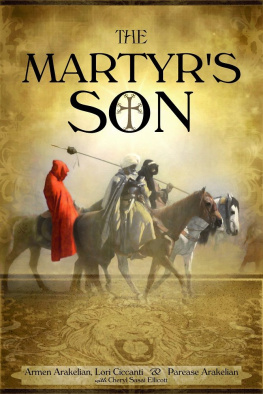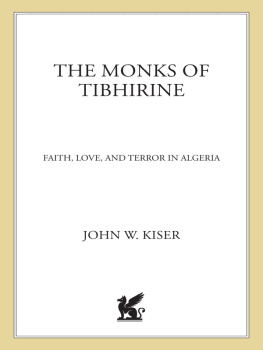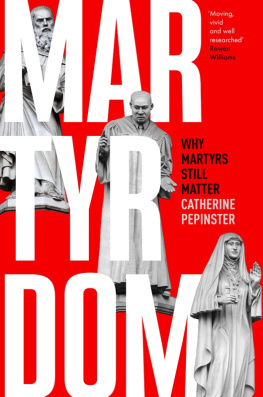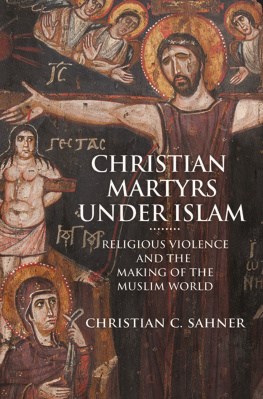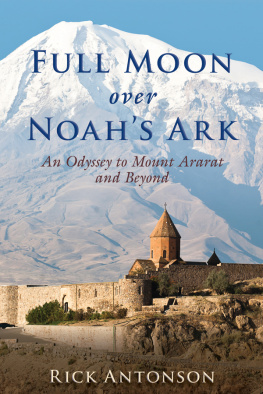THE MARTYRS SON
THE MARTYRS SON
By Armen John Arakelian, Lori Ciccanti and Parease Arakelian,
with Cheryl Sasai Ellicott
Sweetwater Still Publishing
Colcord, Oklahoma
Visit Sweetwater Still Publishing at: www.sweetwaterstill.com
The Martyr's Son 2016 by Armen Arakelian, Lori Ciccanti and Parease Arakelian, with Cheryl Sasai Ellicott. All rights reserved. Cover and interior design by Sweetwater Still. No part of this publication may be reproduced, stored in a retrieval system or transmitted in any form or by any means, electronic, mechanical, photocopying, recording, or otherwise without the prior written permission of the copyright holder, except brief quotations used in a review.
All Scripture quotations are taken from the 1769 King James Version of the Holy Bible (also known as the Authorized Version).
ISBN: E-Book not assigned (Paperback: 978-0-9843599-3-6)
LCCN: E-Book not assigned (Paperback version: 2016933103)
1. Biography 2. Christianity 3. Turkey & Ottoman Empire
Published by Sweetwater Still Publishing, Colcord, Oklahoma USA
Based on the true story of Armenian orphan and genocide survivor,
Armen John Arakelian.
"Be sober, be vigilant; because your adversary
the devil, as a roaring lion, walketh about,
seeking whom he may devour..."
1 Peter 5:8
Table of Contents
From the Authors:
In the mid 1930s Armen Arakelian dictated a portion of his life story to writer Estelle Grant. It was published in 1935 as Under a New Banner , and in 1966 within the book The False Prophet of Mecca .
Unfortunately, the latter half of Armens life wasnt recorded at that time, nor did every character in this story leave behind detailed, written memoirs. Therefore, we've relied upon careful research, family tradition, and, where necessary, cautious speculation to bring certain scenes back to life--to the best of our ability.
We hope you enjoy Armen's story. We pray it impacts you as it has us.
Prologue
In the year 1853, an eleven-year-old boy kneeled to pray inside a little stone cottage, at the foot of Mount Ararat--the final resting-place of the ark of the Bible.
"The God of Abraham, Isaac and Jacob is calling me to pray, to fast, and to wait for an answer," he told his family. The boy, Efim Klubniken, bowed his head and began to wait. He wouldn't sleep, nor would he eat until he'd heard from God.
While the sun passed through the sky, the Klubniken family wondered if God would speak to little Efim. The boy had gone on prayer-vigils before, so they weren't surprised--only curious and expectant. Meanwhile, in the small village of Kara Kala, in the very heart of Armenia, their neighbors went about their business. The villagers were mostly Presbyterian or Orthodox Armenians. They shared a Christian faith, but not the extreme beliefs of the Russian-born Klubniken family. They agreed that a sleep-deprived, starved boy might hear voices, but they doubted it would be the voice of God!
Yet before a day had passed, Efim announced that God had replied with a message.
"What is the message?!" his anxious family asked.
"I don't know," Efim replied, appearing to stare at something invisible.
His relatives looked at one another, and then at Efim in confusion.
"The Almighty is speaking, but I cannot understand," Efim clarified.
What was this? The boy believed God spoke to him, but he didn't know what their Lord had actually said? Perhaps they should make him eat and lie down--after all, he was just a boy.
But Efim persisted. "I see a vision of charts," he said, "and a message in beautiful handwriting. If I had something to write upon, I might copy it down." Efim rose from his knees and went to the family's table. "Will you bring me paper and pen?"
Again his relatives were perplexed. Like many others in the region, the Klubniken family were not educated. Efim had never been to school. He could not read or write. It made no sense, nor was it easy to find what the boy requested.
But at last, a pen and blank paper were brought to him.
For the next seven days, Efim sat at the rough plank-table, staring at something only he could see. He was silent, except for the scritch, scratch, scritch, scratch of his pen upon the paper. Efim didn't eat; he didn't sleep. Stroke after careful stroke, he copied the shape of letters and diagrams that passed before his eyes.
At the end of seven days, Efim plunked down his pen, blinked a number of times, and gazed around at his eager family. His relatives exchanged nervous glances as they stared at the transformed pages; they were now nearly covered in lines, forms and other marks.
"What is it, boy?" someone finally asked. Efim's writing was pretty, but it meant nothing to them.
Efim shrugged. "I don't know, for I cannot read it," he replied.
The family elders discussed the problem. A few of their neighbors could read. Should they show the pages to them? But what might their neighbors think? After all, Efim was completely unschooled. To expect he'd actually written a message, an announcement from the Almighty, no less, would be foolish. Kara Kala was a small village... senseless behavior was never forgotten. Nevertheless, the Klubnikens were people of great faith. Should they limit God by saying He couldn't give a written message to an illiterate boy?! At last they decided to walk by faith; they would take the pages to their neighbors who could read. But first, the women insisted, it was time for Efim to eat something.
As it turned out, Efim had written a totally legible message, in perfectly formed Russian letters--and it claimed to be a warning from God! The message declared that great danger was coming to the Christians in Kara Kala and beyond. Hundreds of thousands of men, women, and children would be brutally murdered, unless they left their homeland.
Leave their homeland? The Klubnikens and their neighbors listened to the message in wonder, until it proclaimed they must flee. Then they erupted with questions and doubts. How could this be? Were they really expected to leave their homes and livelihood because a young boy wrote that they should? How could hundreds of thousands of Christians be murdered, here, in this good and tranquil land?
Yet illiterate young Efim Klubniken had not only written a message in perfectly formed Russian letters, he had drawn maps showing exactly where the fleeing Christians were to go. When the time came, everyone in the region was to flee to a land far away, across the ocean. The maps amazed the educated villagers. This boy had never seen a geography book, but the body of water he drew so accurately was not the nearby Black Sea, nor the Caspian Sea. It wasn't even the farther-off Mediterranean. Efim had drawn an accurate map of the very distant Atlantic Ocean! At its shore, he drew a precise map of the United States of America.
But, the message said, the refugees were not to settle on the eastern side of this new land. They were to travel until they reached the west coast. There God would bless them, and their descendents would be a blessing to the nations. They were to stay there for many, many years, until a time of great persecution threatened that land as well--and at that time, a faithful remnant would again be told where to go.
Villagers were astonished, puzzled and overwhelmed. They had listened to the message intently from beginning to end. Then, during the following weeks and months, they thought about it, they talked about it, they prayed about it, and they even told visitors who passed through Kara Kala about it. It was the most sensational event of their time.
Eventually, each person had to decide what they believed. Was Efim's message really from God, or not? The Bible said to beware of false miracles. They were warned that trusting emotional experiences opened a person up to believing almost anything. In the end, given these truths, most villagers doubted that Efim's message was true. There was undoubtedly a natural explanation for the miraculous writing. They just weren't sure what it was.
Next page
